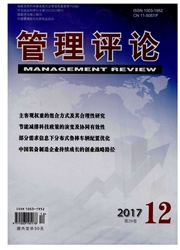

 中文摘要:
中文摘要:
战略性CSR试图破解“企业如何做到赚钱与为善两不误”的经典难题。聚焦于战略性CSR这一核心构念,论文梳理了战略性CSR的内涵,总结和区分了战略性CSR的本质特征和企业特定特征:前者包括目标二元性和专用性,后者包括向心性与应变性。随后,论文整合了制度理论、资源基础观以及动态能力理论,构建了战略性CSR与竞争优势的整体理论框架,提出了战略性CSR通过双重合法性、VRIN资源和动态能力的获取进而帮助企业构建持续竞争优势以及战略性CSR行为的可见性和环境动态性对这一过程的影响机制模型。最后,论文对战略性CSR的未来研究进行了展望。
 英文摘要:
英文摘要:
Strategic corporate social responsibility (strategic CSR) attempts to solve the classic problem of CSR research: how companies are making profits and simultaneously bearing their social responsibility. Focusing on this core construct-strategic CSR, the paper firstly reviews the definition of strategic CSR, then summarizes and distinguishes general and firm-specific features of strategic CSR. Secondly, with theoretical lenses of institutional theory, resource based-view and dynamics capabilities, the paper proposes a general theoretical framework in order to answer the question that how strategic CSR can help a company achieve its competitive advantage. The framework demonstrates that strategic CSR helps a company build its sustainable competitive advantage by acquiring or maintaining dual legitimacy, VRIN resource and dynamics capabilities, and this relationship is moderated by the visibility of strategic CSR behaviors and environmental dynamism. Finally, the paper proposes some suggestion about future researches of strategic CSR.
 同期刊论文项目
同期刊论文项目
 同项目期刊论文
同项目期刊论文
 期刊信息
期刊信息
